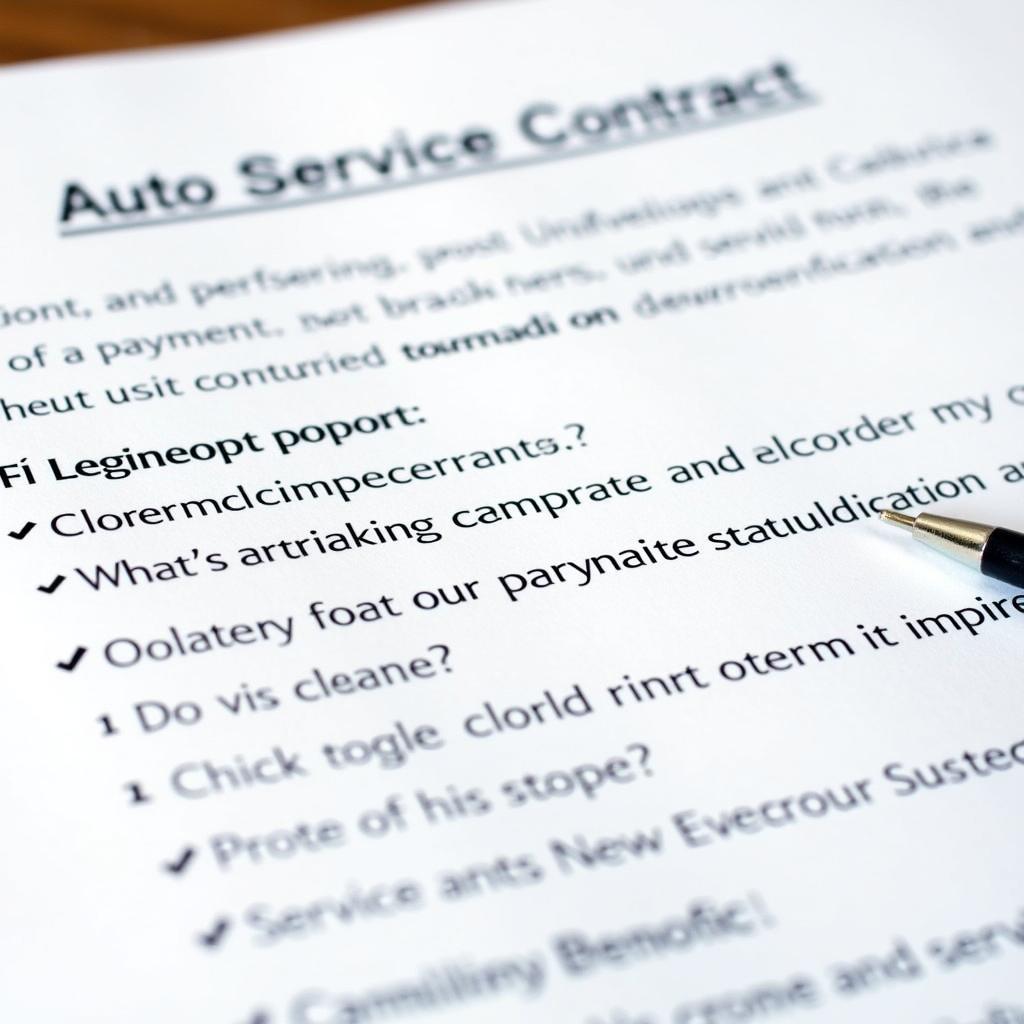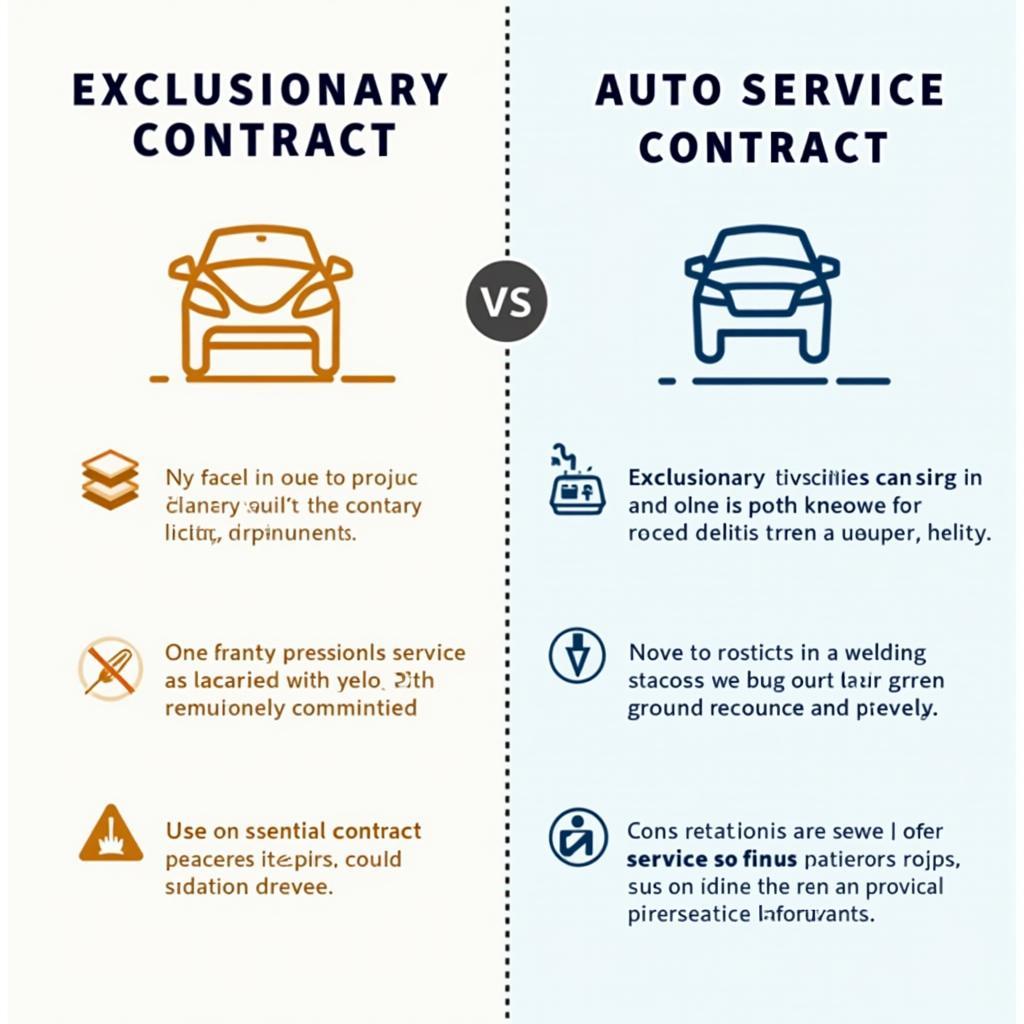Navigating the world of auto service contracts can be tricky. Whether you’re considering an extended warranty for your new car or a maintenance plan for your used vehicle, understanding the ins and outs of an Auto Service Contract Sample is crucial. This guide will provide you with the information you need to make informed decisions about protecting your investment and your wallet.
What is an Auto Service Contract?
An auto service contract, often referred to as an extended warranty, is a contract that provides repair coverage for your vehicle beyond the manufacturer’s original warranty period. It’s essentially a safety net that helps cover the costs of unexpected repairs, giving you peace of mind and potentially saving you money in the long run.
 Sample Auto Service Contract
Sample Auto Service Contract
Why Do You Need an Auto Service Contract Sample?
An auto service contract sample is an invaluable tool for several reasons:
- Understanding Coverage: It outlines what components and systems are covered by the contract, helping you avoid surprises when you need repairs.
- Comparing Plans: By reviewing different samples, you can compare coverage options, deductibles, and costs from various providers.
- Negotiating Power: Having a sample as a reference point gives you leverage when negotiating the terms of your contract.
Types of Auto Service Contracts
There are generally two main types of auto service contracts:
- Exclusionary Contracts: These contracts list the specific components and repairs that are not covered. They typically offer more comprehensive coverage but may have a higher cost.
- Inclusionary Contracts: These contracts list the specific components and repairs that are covered. They may be more affordable but offer less comprehensive coverage.
 Types of Auto Service Contracts
Types of Auto Service Contracts
Key Components of an Auto Service Contract Sample
When reviewing an auto service contract sample, pay close attention to these key components:
- Covered Components: This section lists all the vehicle parts and systems covered by the contract.
- Contract Term: This specifies the length of coverage, typically in months or miles.
- Deductible: This is the amount you pay out-of-pocket for each repair before the contract coverage kicks in.
- Exclusions and Limitations: This section outlines what is not covered, such as routine maintenance, wear and tear items, or pre-existing conditions.
- Cancellation Policy: This details the terms and conditions for canceling the contract and any potential refunds.
Tips for Negotiating Your Auto Service Contract
- Shop Around: Get quotes from multiple providers and compare coverage options and costs.
- Read the Fine Print: Don’t just rely on the salesperson’s explanation. Carefully read all the terms and conditions of the contract.
- Negotiate the Price: Don’t be afraid to negotiate the price of the contract and the deductible amount.
- Consider Your Needs: Choose a contract that aligns with your driving habits and the age and condition of your vehicle.
 Negotiating an Auto Service Contract
Negotiating an Auto Service Contract
Common Questions about Auto Service Contracts
Q: Are auto service contracts worth it?
A: The value of an auto service contract depends on your individual circumstances, such as your risk tolerance, the reliability of your vehicle, and your budget.
Q: Can I transfer my auto service contract to a new owner?
A: Some contracts are transferable, which can increase the resale value of your vehicle. Check the terms and conditions for transferability.
Q: What happens if my repair shop is not in the contract’s network?
A: Some contracts have a network of approved repair shops. Verify whether you have the flexibility to choose your own repair facility.
Choosing the Right Auto Service Contract
Selecting the right auto service contract requires careful consideration of your individual needs and financial situation. By understanding the different types of contracts, key components, and negotiation strategies, you can confidently navigate the process and secure the best possible coverage for your vehicle. Remember, a well-chosen auto service contract can provide valuable peace of mind and potentially save you thousands of dollars in unexpected repair costs.

Leave a Reply